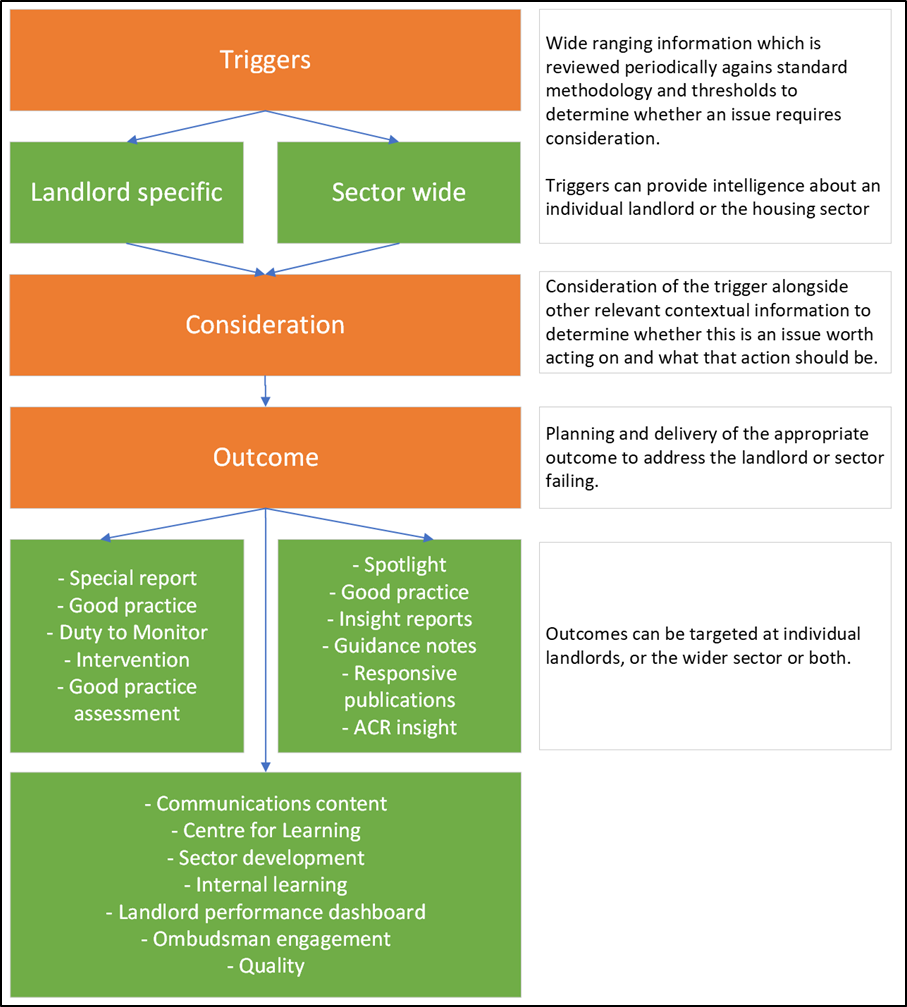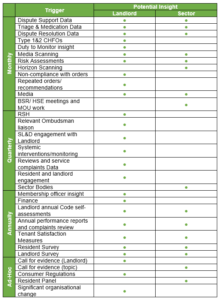Systemic framework
On this page
Introduction
The Housing Ombudsman Scheme allows further investigation into issues which are potentially systemic. The Ombudsman can look beyond individual disputes into the wider and deeper issues responsible for generating complaints and seek to address those issues to improve residents’ lives and landlords’ services.
This systemic framework sets out how we will look beyond individual disputes to identify key issues that impact on residents and landlords’ services, sharing learning with the sector to promote good practice and support a positive complaint handling culture.
The framework enables the Ombudsman to proactively identify and respond to issues and themes impacting residents and the sector. The framework represents an opportunity to maximise the Ombudsman’s role, reaching beyond individual complaints to tackle systemic issues. Our approach on systemic issues will aim to identify:
- failures in complaint handling, including Code compliance, where further work could support earlier resolution of disputes
- service failures, where further investigation into underpinning policies, procedures or approach could prevent service failure reoccurrence
- reoccurring issues across several landlords where further investigation could promote greater understanding and sharing of best practice
The framework is structured to ensure the Ombudsman can track potential warning signs of systemic issues, provide a robust evidence base to decide whether further action is needed, and what that action is. The framework helps us determine potential issues with both individual landlords and the wider social housing sector.
The framework brings together the work of the whole Ombudsman, capturing insight from initial contact through to casework and beyond. It ensures maximum impact through a coherent communication strategy for each outcome, establishing the Housing Ombudsman as the authoritative voice on the resident experience and complaint handling within the housing sector.
Helpful Links
1. Definition of systemic
Factors that may be indicative of a wider, systemic, service failure may include, but are not limited to the following:
- a policy weakness
- repeated or common points of service failure
- service failures across multiple service areas
- service failures across multiple geographical locations
- failure to learn from complaints
- lack of oversight and governance to identify and act on repeated issues
2. Structure
The framework is formed of a 3-part process.
- Triggers: information that causes the Ombudsman to explore a landlord/issue further to determine if it is indicative of a systemic failing
- Consideration: a review of the trigger and other intelligence to inform if the Ombudsman should act and what the most appropriate outcome is to tackle the identified problem
- Outcomes: planning and delivery of the identified appropriate outcome
The framework is designed to capture the maximum amount of information at the outset, resulting in a well-considered, evidence-based, appropriate, and proportionate outcome. This framework outlines how each element works together, with separate accompanying manuals for each outcome.
3. Triggers
The Ombudsman has discretion over how to use its systemic powers. Triggers for the Ombudsman exploring whether an issue is indicative of systemic failings are deliberately wide ranging and high level, so that we are aware of potential issues as early as possible.
This is to ensure our work is relevant and timely and we can be proactive in identifying issues that will generate further complaints if not addressed.
A trigger alone does not indicate there is a potentially systemic issue but prompts the Ombudsman to examine the issue alongside other information and decide an appropriate course of action.
Below is a list of base line triggers and the frequency which the Ombudsman will review them. It is important the Ombudsman remains open to other warning signs, including an absence of data, so the list is not exhaustive.
4. Consideration
The Ombudsman will consider the trigger along with other relevant qualitative and quantitative information to identify patterns or trends and potential areas for further investigation. Deciding whether we can and should act, and what level of response is appropriate and proportionate. Thorough and timely consideration will establish a robust evidence base for doing so. The consideration phase of the process is crucial to ensuring that the next steps are appropriate and proportionate.
The decision to act will be based on several factors, including but not limited to the below.
Landlords:
- the level of, and reasons for the determinations made
- risk assessment of cases
- other sector reports into the landlord
- the Ombudsman's landlord intelligence log
- the landlord's Complaint Hnalding Code self-assessment
- the Ombudsman's intervention history with the landlord
- adequacy of the landlord's complaints policy against the Complaing Handling Code
- other landlord triggers
Sector:
- volume and outcome of complaints on one theme
- the Ombudsman's insight reports
- insight history into the identified theme
For both:
- the Housing Ombudsman's casework data, inclduing absence
- the level of detriment and potential scale of the impact
- number of landlords and/or resident impacted
- the length of time the issue has persisted
- the Ombudsman's discretion
- jurisdiction
5. Outcome
Once the Ombudsman has decided to act, we will be proportionate in our response, continuing to be inquisitorial. It is important we select the right outcome that proportionately addresses the issues identified. Outcomes range from specific actions with individual landlords to sharing learning and best practice with all landlords through our publications.
Potential outcomes include the below.
Landlords:
- special report
- type 3 CHFO
- wider order
- post CHFO non-compliance activity
- good practice assessment
- Centre for Learning referral
- engagement with the landlord's governing body
- Regulatory referral
Sector:
- Spotlight report
- good practice
- insight reports
- guidance notes
- responsive publications
- ACE insight
- Centre for Learning content
- Landlord performance dashboard
For both:
- Ombudsman engagement
There may also be content for internal dissemination through our quality and communications channels.
Where necessary, the Ombudsman may add additional outcomes. For example, while actively managing a landlord, further evidence becomes available that necessitates referral to the governing body.
6. Reporting and publication
Where appropriate, details of our investigations will be made available on our website. This will include:
- reasons for, and scope of, the investigation
- details of how anyone affected or holding relevant information can contribute to the investigation
- dates and milestones for responses
The purpose of publication is to raise awareness of issues and to share good practice and recommendations with landlords, building on our aim of establishing a positive complaint handling culture across the sector. We will publish information on our systemic work, including analysis, reports, and recommendations, with appropriate consultation with landlords prior to publication. Where appropriate, landlords will be named.
We will publish the name of any landlord and the details of any formal referral to a governing body or to the appropriate regulatory body.


